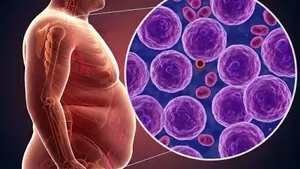Can Obesity Cause Cancer?
The fact that obesity and being overweight are associated with an increased risk of 12 different forms of cancer might shock you. In the United States, these tumors represent 43% of all malignancies diagnosed per year.
Cancer is related to some factors, but two of the most important things you can do to reduce your risk include ceasing smoking and maintaining a healthy weight.
Obesity or being overweight does not ensure that a person will develop cancer. However, it does indicate that their risk of developing cancer is higher than if they maintained a healthy weight.
Which types of cancer have to do with obesity?
- Adenocarcinoma of the esophagus.
- Breast (regarding ladies who have had menopause).
- Colon and rectum.
- Uterus.
- Gallbladder.
- Upper stomach.
- Kidneys.
- Liver.
- Ovaries.
- Pancreas.
- Thyroid.
- Meningioma (a type of brain cancer).
- Multiple myeloma
How could cancer cause obesity?
Obesity and the risk of cancer are connected. However, it’s unclear exactly how one leads to the other.
Fat cells’ messages can have an impact on:
Hormone Production
- Growth hormones – Growth hormones, which instruct cells to divide more frequently, can increase when body fat levels are too high. This increases the potential for the development of cancer cells.
- Inflammation – Wherever there are a lot of fat cells in the body, immune cells go there. Inflammation may result from this, which speeds up cell division. This may end up increasing the chance of developing cancer.
- Sex hormones – The hormone estrogen is produced by fat cells following menopause. This hormone may increase the frequency of cell division in the womb and breast, raising the risk of cancer.
According to current research, these are the primary ways that excess body fat can lead to cancer. But more is being discovered via research.
- In the UK, being overweight or obese is the second leading cause of cancer, contributing to approximately 1 out of every twenty cases.
- The risk increases with the length of time you have been overweight and your degree of obesity.
Following cigarette smoking, becoming overweight or obese is the second biggest cause of disease in the UK. Being overweight increases your risk of developing cancer compared to being at a healthy weight.
Being overweight is not a guarantee that you will get cancer. However, the longer you have been overweight and the more overweight you are, the greater the danger. Losing weight and preventing weight gain can help lower your risk of developing cancer if you are overweight.
The advantages of maintaining a healthy weight are numerous. These include having more vitality and being less predisposed to diseases like joint discomfort, heart disease, and stroke.
Insulin production
A disorder known as hyperinsulinemia, in which the body produces higher amounts of insulin, can also occur in obese people. Additionally, some obese individuals have increased insulin levels, which may raise their risk of colorectal, renal, pancreatic, and other malignancies.
Chronic inflammation
Chronic inflammation may be aggravated by fat cells. Inflammation normally arises as a response to illness or damage and is frequently an indication that the body is self-healing. Chronic inflammation, however, has the potential to harm cellular DNA over time, which could result in unchecked cell proliferation and tumor development.
Chronic inflammation may also be made more likely by hyperinsulinemia.
Cell regulation
The internal mechanisms of proteins that control cell division and proliferation may be impacted by fat cells. Cells may divide and proliferate uncontrollably as a result, eventually developing into tumors.
Immune suppression
According to recent studies, obesity may change the metabolism of immune cells that are present close to tumor cells, weakening them. The immune cells’ capacity to target and eliminate cancer cells is altered by these modifications.
How do researchers know that cancer is caused by obesity?
Millions of people have contributed to centuries of high-quality research demonstrating the link between obesity and cancer, and we can be certain that obesity causes cancer because the risk rises with weight gain and duration. There are also solid explanations for how fat cells can lead to the development of cancer.
Do I maintain a healthy level?
The probability of contracting conditions like carcinoma, stroke, hypertension, and diabetic complications increases with weight.
Although there isn’t a single ideal weight, there are a few techniques that can help you determine if your weight is within a healthy range.
Body Mass Index (BMI)
The BMI metric calculates if you are at a healthy weight by considering your height and weight. Although BMI isn’t a perfect tool, it can be a useful place to start when considering weight. It can determine if you are underweight, overweight, obese, or within a healthy weight range for your height.
Racial ancestry also affects what is considered an ideal weight.
A BMI of 26 or above indicates overweight in adults of South Asian, Chinese, other Asian, Middle Eastern, Black African, or African-Caribbean ethnicity, and a BMI of 26.4 or higher indicates obesity.
Adults who do not belong to these ethnic groups are considered overweight if their BMI is 24 or higher, and obese if their BMI is 35 or higher.
Which effect does obesity have on the diagnosis and treatment of cancer?
In addition to raising the risk of cancer, obesity may also make diagnosis more difficult, decrease the efficacy of some cancer treatments, and make managing side effects more difficult.
According to research, cancer patients who are obese do worse after therapy than those who are not.
The effectiveness and toxicity of systemic cancer treatments, such as immunotherapy, endocrine therapy, chemotherapy, and targeted therapies, can be impacted by obesity.
According to a California study supported by the NCI, fat cells may absorb and degrade conventional chemotherapy medications, decreasing their effectiveness. This discovery could help clarify why obesity is associated with worse outcomes for some cancer types.
Cancer and obesity: Lowering the danger
Variables that may contribute to obesity itself are further raising the risk of cancer that obesity poses. Including them:
- Poor diet
- Alcohol use
- Lack of exercise
On the other hand, a healthy diet, abstinence from alcohol, and regular exercise may help lower body weight and the risk of cancer. Those with a cancer diagnosis benefit from these actions as well.
According to Dr. Lynch, improving general health will just put a person in a better place physically and emotionally. Exercise has psychological advantages and enhances sleep quality.
What is the influence of obesity on cancer survivors?
Persons with a diagnosis of colorectal, prostate, or breast cancer provide the majority of the data regarding obesity in cancer survivors. Numerous elements of cancer survivorship, such as quality of life, cancer progression, cancer recurrence, prognosis (survival), and the chance of developing some second primary malignancies, may be negatively impacted by obesity, according to research.
Obesity, for instance, is linked to higher chances of incontinence in post-radical prostatectomy prostate cancer survivors and treatment-related lymphedema in breast cancer survivors. Patients with stage II and stage III rectal cancer in a large clinical study were more likely to experience a local recurrence if their baseline BMI was higher, especially if they were men. Those with the highest levels of obesity have a 50% higher risk of dying from multiple myeloma than those who are at a healthy weight.
FAQs
What is the consequence of obesity on cancer therapy?
Patients who are obese may experience more side effects or less effective treatment, which can be problematic during cancer treatment. Weight management is a crucial part of cancer care and follow-up, as cancer patients may experience significant weight gain or loss during or after treatment.
Which obesity treatment is particularly beneficial?
presently the sole option for treating morbid obesity in patients who have already tried diet, exercise, and medication is weight-loss surgery, sometimes known as bariatric surgery.
What types of cancer are more common in obese people?
Obesity is responsible for as many as 2-5% of all malignancies. Some serious malignancies, such as postmenopausal breast, colorectal, endometrial, renal, esophageal, pancreatic, liver, and gallbladder cancer, are associated with obesity.
What kind of cancer makes you gain weight?
Gaining weight is a symptom of some cancer types. For instance, fluid accumulation in the legs or belly may be a symptom of colorectal and ovarian cancer.
Does cancer benefit from weight loss?
There is little data on how weight loss may reduce the risk of cancer. However, there is mounting evidence that weight loss may lower the risk of various cancers, including endometrial cancer and breast cancer (postmenopausal).
References
- Obesity and Cancer fact sheet. (2022, April 5). Cancer.gov. https://www.cancer.gov/about-cancer/causes-prevention/risk/obesity/obesity-fact-sheet
- Does obesity cause cancer? Discover risks, types, and reasons. (n.d.). City of Hope. https://www.cancercenter.com/community/blog/2024/02/does-obesity-cause-cancer
- Underferth, D. (2020, May 8). How does obesity cause cancer? MD Anderson Cancer Center. https://www.mdanderson.org/publications/focused-on-health/how-does-obesity-cause-cancer.h27Z1591413.html
- Seladi-Schulman, J., PhD. (2024, January 16). Obesity and the risk of cancer. Healthline. https://www.healthline.com/health/obesity/obesity-and-cancer
- Weighing the risks: obesity is now tied to 11 types of cancer | Cancer | UT Southwestern Medical Center. (n.d.). https://utswmed.org/medblog/obesity-cancer/




